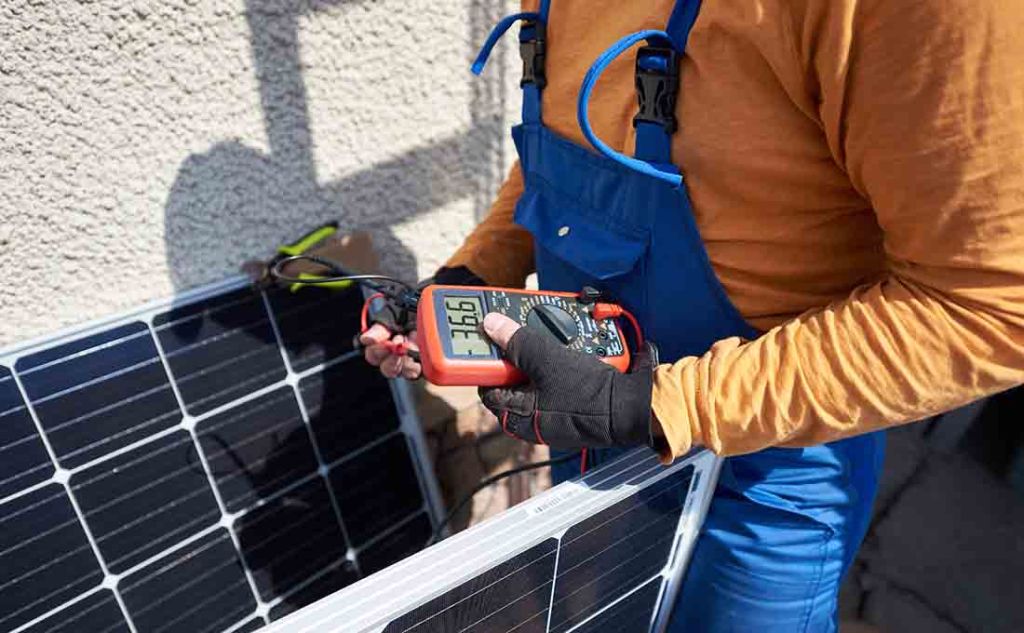When it comes to solar panel systems, there are a variety of factors to consider, from the type of solar panels to the size of the battery bank. One of the most important decisions you’ll need to make is what voltage your system should be. The three most common voltages for solar panel systems are 12V, 24V, and 48V, each with its own advantages and disadvantages. In this blog post, we’ll take a closer look at these three voltage options and help you determine which one is the best fit for your needs.

What is a Solar Panel System?
Before we dive into the details of voltage options, let’s briefly review what a solar panel system is. A solar panel system consists of solar panels, a battery bank, an inverter, and wiring to connect all of the components. Solar panels convert sunlight into DC electricity, which is then stored in the battery bank. The inverter converts the DC electricity into AC electricity, which can be used to power household appliances and electronics.
12V Solar Panel System
A 12V solar panel system is the most basic and least expensive option. It is typically used for small off-grid systems, such as for RVs or cabins, where only a few appliances need to be powered. A 12V system requires fewer solar panels and a smaller battery bank than a 24V or 48V system, which can be an advantage if you have limited space or budget.
However, a 12V system has some drawbacks. Because the voltage is low, the system is less efficient than a higher voltage system. Voltage drop can also be an issue, especially if the system is large or the wiring is long. A 12V system is also limited in terms of power output, so it may not be suitable for larger households or homes with high energy demands.
24V Solar Panel System
A 24V solar panel system is a step up from a 12V system in terms of efficiency and power output. It is suitable for larger off-grid systems, as well as grid-tied systems with energy storage. A 24V system requires more solar panels and a larger battery bank than a 12V system, but it can handle higher loads and longer wiring distances.
One of the main advantages of a 24V system is that it is more efficient than a 12V system. With a higher voltage, the system experiences less voltage drop, which means less energy is lost as heat. A 24V system is also more flexible than a 12V system, as it can handle both small and large loads.
48V Solar Panel System
A 48V solar panel system is the most efficient and powerful option. It is suitable for large off-grid systems, as well as grid-tied systems with energy storage. A 48V system requires even more solar panels and a larger battery bank than a 24V system, but it can handle the highest loads and longest wiring distances.
One of the main advantages of a 48V system is that it is the most efficient option. With an even higher voltage, the system experiences even less voltage drop, which means less energy is lost as heat. A 48V system is also the most flexible option, as it can handle both small and large loads with ease.
Choosing the Right Voltage for Your Solar Panel System
Now that you have a better understanding of the advantages and disadvantages of each voltage option, how do you choose the right one for your solar panel system? Here are some factors to consider:
- Energy needs: The first factor to consider is your energy needs. How many appliances and electronics do you need to power? What is your daily energy consumption? A larger system with a higher voltage may be necessary if you have a high energy demand.
- Available space: The second factor to consider is available space. How much space do you have for solar panels and a battery bank? A smaller system with a lower voltage may be necessary if you have limited space.
- Cost: The third factor to consider is cost. A 12V system is the least expensive option, but may not be sufficient for larger households or high energy demands. A 48V system is the most expensive option, but may be necessary for large off-grid systems.
- Efficiency: The fourth factor to consider is efficiency. A higher voltage system is generally more efficient than a lower voltage system, but may require more solar panels and a larger battery bank.
- Maintenance: The final factor to consider is maintenance. A higher voltage system may require more maintenance and specialized equipment than a lower voltage system.
In summary, choosing the right voltage for your solar panel system requires careful consideration of your energy needs, available space, cost, efficiency, and maintenance requirements. A 12V system is the most basic and least expensive option, while a 48V system is the most efficient and powerful option. A 24V system is a good middle ground that offers both efficiency and flexibility. Ultimately, the best voltage for your solar panel system will depend on your individual circumstances and priorities.
Remember to also take into account the cost of installation, as well as the cost of maintenance and repairs over the lifetime of the system. No matter what voltage you choose, investing in a solar panel system is a smart decision that can help you reduce your carbon footprint and save money on energy bills in the long run.

Rattling nice design and fantastic subject material, nothing else we need : D.